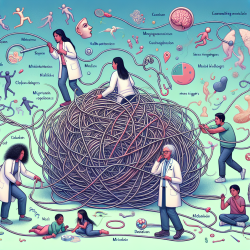Understanding the Interplay of Stress, Migration, and Health: Insights for Practitioners
As practitioners dedicated to improving outcomes for children, it is crucial to understand the multifaceted challenges that immigrant families face, particularly those from Mexico. The research article "Stress, migration, and allostatic load: a model based on Mexican migrants in Columbus, Ohio" provides valuable insights into how stressors associated with migration impact health through allostatic load, a concept that refers to the cumulative burden of chronic stress and life events.
Migration is a significant life event that introduces numerous stressors, including family separation, acculturation, and discrimination, which can lead to increased allostatic load. This load, in turn, affects physical and mental health, often resulting in chronic conditions. For children, these stressors can manifest in various ways, affecting their development and educational outcomes.
Implementing Research Findings in Practice
Practitioners can leverage the findings from this research to enhance their practice by considering the following strategies:
- Integrate Biomarkers in Assessments: Incorporate physiological biomarkers into health assessments to obtain a more comprehensive understanding of a child's health status. Biomarkers provide objective data that can reveal stress-related physiological dysregulation not apparent through self-reports or narratives.
- Understand the Role of Narratives: Encourage families to share their migration narratives. These stories provide context and insight into the lived experiences of migrants, offering a lens through which practitioners can better understand the challenges faced by children and their families.
- Address Acculturation Challenges: Develop programs that support acculturation processes, focusing on language acquisition, cultural adaptation, and social integration. These programs can help mitigate the stressors associated with migration and improve health outcomes.
- Promote Cultural Sensitivity: Cultivate an environment of cultural sensitivity and awareness within your practice. Understanding and respecting cultural differences can enhance communication and trust between practitioners and immigrant families.
Encouraging Further Research
While this study provides a foundational understanding of the relationship between migration, stress, and health, there is a need for further research to explore these dynamics across different populations and settings. Practitioners are encouraged to collaborate with researchers to investigate regional patterns and develop tailored interventions that address the unique needs of immigrant communities.
To read the original research paper, please follow this link: Stress, migration, and allostatic load: a model based on Mexican migrants in Columbus, Ohio.










